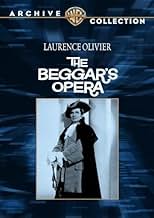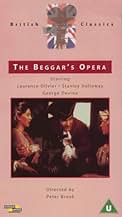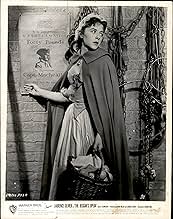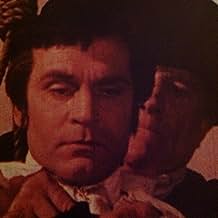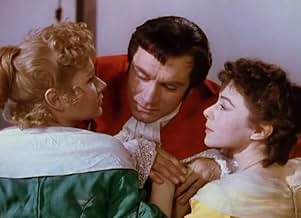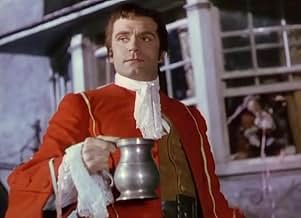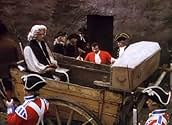AVALIAÇÃO DA IMDb
6,1/10
413
SUA AVALIAÇÃO
Adicionar um enredo no seu idiomaWhen the composer of an opera about a swashbuckling, wenching highwayman meets his hero's real-life counterpart, he's disappointed with his lack of dash.When the composer of an opera about a swashbuckling, wenching highwayman meets his hero's real-life counterpart, he's disappointed with his lack of dash.When the composer of an opera about a swashbuckling, wenching highwayman meets his hero's real-life counterpart, he's disappointed with his lack of dash.
- Direção
- Roteiristas
- Artistas
- Direção
- Roteiristas
- Elenco e equipe completos
- Produção, bilheteria e muito mais no IMDbPro
Avaliações em destaque
As was said in my review for the 1963 production of the Britten version, John Gay's ballad/satirical opera 'The Beggar's Opera' is a lot of fun and it is no wonder it's popular with most, the dialogue, music and characters are all great. Benjamin Britten's radically different but enormously enjoyable and melodious, an ingenious and often brilliant modern re-imagining that shows the composer's individual treatment of folk-songs, version is also well worth it as well.
This 1953 film may not be completely ideal, but it is still intriguing and entertaining with a good deal to like. Occasionally, some of the dialogue loses impact when director Peter Brook tries to open up the action. While there are wonderful, imaginative visuals, Brook's directorial inexperience shows with some of the drama a bit undistinguished and stagy.
However, 'The Beggar's Opera' (1953) is a very handsome-looking film, with stylish production and costume design and some imaginative photography that succeeds in opening up the action. The music is a superb mix of rousing fun and heartfelt nuance. Most of the dialogue crackles with sharp wit and avoids being too wordy.
Most of the story absorbs and is lively in pacing, with the action being just about easy to follow and the twist is well executed.
Laurence Olivier may not have the best singing voice there is, but has charismatic swagger and energy aplenty. Hugh Griffith, Dorothy Tutin, George Devine and Stanley Holloway give him strong support.
All in all, intriguing and entertaining if not the most ideal version. 7/10 Bethany Cox
This 1953 film may not be completely ideal, but it is still intriguing and entertaining with a good deal to like. Occasionally, some of the dialogue loses impact when director Peter Brook tries to open up the action. While there are wonderful, imaginative visuals, Brook's directorial inexperience shows with some of the drama a bit undistinguished and stagy.
However, 'The Beggar's Opera' (1953) is a very handsome-looking film, with stylish production and costume design and some imaginative photography that succeeds in opening up the action. The music is a superb mix of rousing fun and heartfelt nuance. Most of the dialogue crackles with sharp wit and avoids being too wordy.
Most of the story absorbs and is lively in pacing, with the action being just about easy to follow and the twist is well executed.
Laurence Olivier may not have the best singing voice there is, but has charismatic swagger and energy aplenty. Hugh Griffith, Dorothy Tutin, George Devine and Stanley Holloway give him strong support.
All in all, intriguing and entertaining if not the most ideal version. 7/10 Bethany Cox
When this movie opened it scarcely caused a ripple in Britain and even less so in the U.S. I don't know why. It's a telling of John Gay's great work written in 1728, and the play was a blockbuster 280 years ago. It's supposed to be the first English "opera" that told a story through song and which was aimed to entertain the people. Gay took melodies wherever he found them, wrote lyrics to them to advance the storyline, and had a hit. And in another version, it still is. The Threepenny Opera by Kurt Weill and Bertolt Brecht (with Blitzstein's redone lyrics) is a fixture in theaters, and Mack the Knife is still a popular song.
Lawrence Olivier plays Macheath, a rollicking highwayman with "wives" all over London. He has two in particular, Polly Peachum, the daughter of his fence, and Lucy Lockit, the daughter of his jailer. The story of Macheath's adventures, captures and escapes are all told in song. There are horse riding songs, love songs, gambling songs, longing songs, lustful songs. The story starts in a London prison where Macheath awaits hanging. A beggar just tossed into the prison has written an opera about Macheath. He starts to tell it to the inmates and the movie takes off.
The songs are great fun and the style of the movie is very much the look of 18th century London. You can feel the fleas in the wigs, the lice in the clothes, the sheen of greasy lips, the stink of unwashed bodies.
And there are some sharp lines. "A miser might as well be satisfied with one guinea as I with one wife." "Love is a misfortune that can happen even to an indiscreet girl." "I can tell by your kiss that your gin is excellent." And when pointing out that consummation needn't wait for marriage, "Friends should not insist on ceremony."
Olivier does a masterful job, handling his own stunts, horse work and, most bravely, his own singing. He's good. On the day of Macheath's hanging, he's carted out to the gallows, sitting jauntily on his casket. While a grim-faced preacher is screaming at him to repent, he's sweeping up wenches to kiss, downing tankards of ale held up to him, and making a little girl laugh while bouncing her on his knee. Olivier plays it with great verve.
And while there's not exactly a reprieve, there is a joyous escape.
If you like Olivier, if you like things British, if you like quirky films that will probably be forgotten, this is worth seeing.
Lawrence Olivier plays Macheath, a rollicking highwayman with "wives" all over London. He has two in particular, Polly Peachum, the daughter of his fence, and Lucy Lockit, the daughter of his jailer. The story of Macheath's adventures, captures and escapes are all told in song. There are horse riding songs, love songs, gambling songs, longing songs, lustful songs. The story starts in a London prison where Macheath awaits hanging. A beggar just tossed into the prison has written an opera about Macheath. He starts to tell it to the inmates and the movie takes off.
The songs are great fun and the style of the movie is very much the look of 18th century London. You can feel the fleas in the wigs, the lice in the clothes, the sheen of greasy lips, the stink of unwashed bodies.
And there are some sharp lines. "A miser might as well be satisfied with one guinea as I with one wife." "Love is a misfortune that can happen even to an indiscreet girl." "I can tell by your kiss that your gin is excellent." And when pointing out that consummation needn't wait for marriage, "Friends should not insist on ceremony."
Olivier does a masterful job, handling his own stunts, horse work and, most bravely, his own singing. He's good. On the day of Macheath's hanging, he's carted out to the gallows, sitting jauntily on his casket. While a grim-faced preacher is screaming at him to repent, he's sweeping up wenches to kiss, downing tankards of ale held up to him, and making a little girl laugh while bouncing her on his knee. Olivier plays it with great verve.
And while there's not exactly a reprieve, there is a joyous escape.
If you like Olivier, if you like things British, if you like quirky films that will probably be forgotten, this is worth seeing.
John Gay's original Beggar's Opera was a spoof of the high-blown operas of his day. The Olivier film is a spoof of--movie musicals! Sir Laurence sings on horseback; people burst into arias at the worst possible time. The plot goes from the absurd to the absurd. However, if the viewer tries to see it "straight," she will be confused and put off. I don't know why this delightful film is not available on laserdisc or even videotape. Someone should dig it out of the vault and re-introduce it to the world.
This is a wonderfully odd movie, with Laurence Olivier doing his own singing in a film version of the first English musical ever written. The cinematography is very attractive, with the characters dressed in bright primary colours - the scene near the beginning with Macheath galloping through the countryside, the camera following alongside, turns into an exhilarating blur of flashing red coat, brown horse and greenery. The music and singing continue nonstop throughout the movie - it was originally written as a mock opera, and there is no attempt to update or adapt it for modern tastes. As such, it takes a bit of getting used to, but for those who can get into the 18th-century spirit of things, it is a very enjoyable experience.
The Beggar's Opera has so much going for it. The author, John Gay placed it squarely in an underworld of thieves, whores, liars, drunkards, double-crossers, and corrupt officials. He gave them a witty voice, where moral values are reversed, and most importantly he gave them newly worded songs set to recent popular tunes.
The Beggar's Opera continues to be an important work, that has been raided by later writers; most importantly by Brecht who adapted its main elements as The Threepenny Opera; and also by writers such as Dennis Potter (Pennies From Heaven clearly borrows heavily from from The Beggar's Opera, down to the final twist).
This is a film that should work well as a film-of-the-stage, for there is always a sense that the characters are trapped in their little world, in each other's pocket, and all knowing each other's business. But Peter Brook tries to make the film more cinematic by opening the action out in places. Though this is understandable, it entails some unfortunate compromises. The attempt to inject some new life into this film, with primarily visual scenes and a bit of derring-do action, means that Brook is forced to cut the text severely in places, and the strength of the piece lies in the words Gay wrote, not in the pictures that Brook creates. The film works well where the original text survives and the characters are allowed to speak, but that happens rarely. And Brook also messes about with the twist-ending!
In brief, enough survives of the original to make it worth watching, if there's no better alternative.
The Beggar's Opera continues to be an important work, that has been raided by later writers; most importantly by Brecht who adapted its main elements as The Threepenny Opera; and also by writers such as Dennis Potter (Pennies From Heaven clearly borrows heavily from from The Beggar's Opera, down to the final twist).
This is a film that should work well as a film-of-the-stage, for there is always a sense that the characters are trapped in their little world, in each other's pocket, and all knowing each other's business. But Peter Brook tries to make the film more cinematic by opening the action out in places. Though this is understandable, it entails some unfortunate compromises. The attempt to inject some new life into this film, with primarily visual scenes and a bit of derring-do action, means that Brook is forced to cut the text severely in places, and the strength of the piece lies in the words Gay wrote, not in the pictures that Brook creates. The film works well where the original text survives and the characters are allowed to speak, but that happens rarely. And Brook also messes about with the twist-ending!
In brief, enough survives of the original to make it worth watching, if there's no better alternative.
Você sabia?
- Curiosidades"The Beggar's Opera" is a ballad opera popular during the early eighteenth century, which used the music of popular folk songs, ballads and church hymns set to new lyrics to satirize social customs, mores, and especially Italian opera. It copied the three act Italian operatic format, rather than the then-custom of five acts.
- Citações
Captain MacHeath: [Hearing a woman singing] Women!... I love the sex!... and a man who loves money might as well be contented with one guinea... as I with one woman.
- Cenas durante ou pós-créditosUnusually, the ghost vocalists for the non-singing actors were given billing in the end credits.
- ConexõesFeatured in Carry on Forever: Episode #1.1 (2015)
Principais escolhas
Faça login para avaliar e ver a lista de recomendações personalizadas
Detalhes
Bilheteria
- Orçamento
- £ 500.000 (estimativa)
- Tempo de duração
- 1 h 34 min(94 min)
- Cor
- Proporção
- 1.37 : 1
Contribua para esta página
Sugerir uma alteração ou adicionar conteúdo ausente

